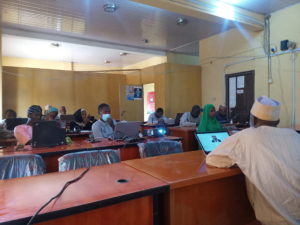REPORT OF A ONE DAY CAPACITY BUILDING ON REPORT WRITING TO CENTRE FOR INFORMATION TECHNOLOGY AND DEVELOPMENT (CITAD) STAFF HELD ON THE 5TH OF APRIL, 2021 AT CITAD SOCIAL MEDIA LABORATORY
Report writing is one of the most important components of an organization which tells much and how strong and capable that organization is. Report is a pillar that holds organizations, and for this it must be cleared, elaborative and detailed in order to tell the story of events as they happened. Report can also be an account on what, how, when, where and on whom an activity is conducted for and they must come immediately after an activity is conducted or as when required. Projects managers/implementers are expected to give a detailed account on how they conducted the activity including: achievements, lessons learned and recommendations so as to justify the resources put in carrying out such an activity.Â
Many organizations today are facing serious challenges in the area of reporting their activities or having an acceptable reports in the case of Non-Governmental Organizations, for this reason the Centre for Information Technology and Development organized a one day refresher training to its staff on the 5th of April, 2021 at CITAD Social Media Laboratory. The objectives of organizing the training was to: enhance the capacity of CITAD staff on report writing and expose the staff to different styles of report writing. The training were conducted by Malam Mustapha Ibrahim Chinedu, Director Innovation, Brahstar MediaCom and Malam Y.Z Ya’u, Executive Director, CITAD.
In his welcome remarks, the Executive Director of CITAD, Malam Ya’u stated that the training is organized to keep updating the knowledge of the organization’s staff so as to be equipped with the today’s knowledge of report writing. He also stated that mastering report writing is the number one skill of any organization, emphasizing that the training is not only for the organization’s benefits but also for the staff’s benefits. Explaining further, Malam Ya’u said an activity will not be considered being conducted until a report is being written. Finally he called on the staff present at the training to pay more attention and ensure they have learn what is going to be taught.
The first session of the training focused on understanding the purpose and types of reports/structure and components of formal reports. Malam Mustapha, who took this session started with definition of report writing where he stated that report is a “Detailed account of event either in written or verbalâ€. While speaking on the purpose of writing report, the tutor explained that, a report is written in order to: inform or provide information or interpret known facts; explain specific events; document events; obtain agreement to a course of action; form basis of discussion. Discussing further, Malam Chinede said there are different reports that suit different organizations, some of the reports according to him are: formal, informal which include narrative, descriptive, expository, pictorial, statistical, long/short. Also the participants were taught the best practices in report writing, report structure, methodology and how to support your reports with evidences. Finally, he took the participants through good and bad reports. Here, Malam Ibrahim discussed on how one can write good report and how to avoid writing a bad report.Â
In the second session of the training, Malam Y.Z Ya’u discussed with participants the language of formal report writing, accuracy and factuality. In this aspect, Malam Ya’u started with key points that every report writer needs to know and adhere to. Malam Ya’u made it clear to the participants that a formal report is not a poetry contest so report writers should avoid figures of speech like metaphors and similes, also in formal report emotional embellishments and ambiguous words should be avoided, and opinions that are not supported by facts. In discussing about the language to be used in reports, Malam Ya’u said writers should always be formal; words such as can’t, don’t and the use of impersonal, passive voice and circular definition should all be avoided. Discussing further, Malam Ya’u said mastering Brevity, Coherence, Clarity and being Accurate is important in writing formal reports. Finally he discussed the induction and deduction parts of writing a formal reports.
Participants at the training were given the opportunity to make contributions and ask questions which made the training more participatory.Â
   Â


Leave a Reply